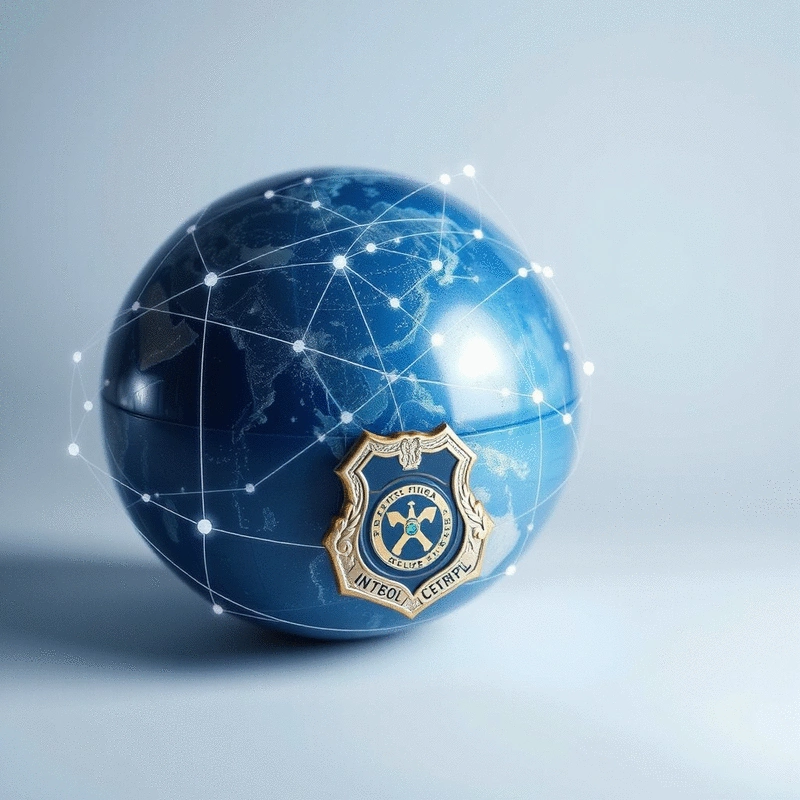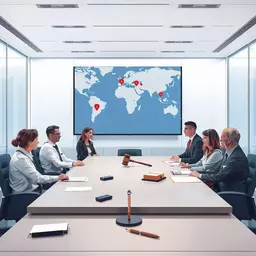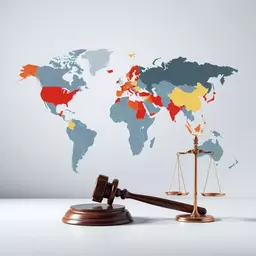Interpol's Influence on Extradition Processes

In an increasingly globalized world, the intricate process of extradition ensures that justice transcends borders, with organizations like Interpol playing a pivotal role. How does international cooperation among law enforcement agencies unfold to bring criminals to justice? This article delves into the essential functions of Interpol in facilitating extradition, highlighting its significance in upholding global justice.
What You Will Learn
- Extradition is a mutual legal assistance framework that promotes global justice by preventing criminals from evading justice across borders.
- Interpol issues Red Notices to alert member countries about wanted individuals, thereby aiding in international cooperation.
- National Central Bureaus (NCBs) serve as critical points of contact for managing extradition requests and ensuring legal compliance.
- Effective communication networks established by Interpol streamline the flow of information, allowing for prompt action in extradition cases.
- Interpol emphasizes the importance of human rights in extradition processes, adapting legal standards to meet the evolving landscape of global crime.
Key Steps in the Extradition Process
Understanding the steps involved in extradition is crucial for appreciating how Interpol facilitates international cooperation. Below are the key stages in the extradition process.
1. Issuance of a Request
A country issues a request for extradition based on a legal warrant.
2. Red Notice Release
Interpol issues a Red Notice to alert member countries about the wanted individual.
3. Legal Assessment
The requested country evaluates the legality of the extradition request.
4. Decision Making
Authorities decide whether to honor the extradition based on legal frameworks.
5. Implementation
If approved, the extradition is carried out, and the individual is transferred to the requesting country.
The Role of Interpol in Global Extradition Processes: An Overview
In today's interconnected world, the process of **extradition** plays a vital role in maintaining justice across borders. Extradition is essentially the legal process by which one country hands over a person accused or convicted of a crime to another country. Understanding this complex mechanism is crucial for anyone involved in international law or confronting extradition challenges, making the insights from Extradition Interpol UAE particularly invaluable.
Have you ever considered how different countries cooperate to ensure that justice is served? This is where Interpol comes into play, acting as a crucial facilitator in extradition processes. By providing a platform for international police cooperation, Interpol helps law enforcement agencies around the world share information and coordinate actions effectively.
Understanding Interpol's Functionality in Extradition
To grasp Interpol's role in extradition, we first need to define what extradition is. It’s not just about arresting fugitives; it’s about a framework of mutual legal assistance that upholds international law. Here are some essential points regarding extradition’s significance:
- Promotes global justice by ensuring that criminals cannot escape justice by fleeing across borders.
- Facilitates cooperation between nations in handling serious crimes, such as drug trafficking and terrorism.
- Enhances trust among countries, fostering a collaborative approach to law enforcement.
Defining Extradition and Its Global Importance
Extradition plays a vital role in international relations, especially concerning safety and security. It's not just about catching individuals; it’s about respecting international laws and treaties. The significance of extradition translates into a shared responsibility among nations to uphold justice.
Think of it as a chain that links various legal systems, making it possible for countries to work together. In this context, Interpol stands as a central figure, providing the necessary tools and frameworks that facilitate this cooperation.
The Significance of Interpol as an International Police Organization
As you may know, Interpol is more than just a network of police; it’s a powerful organization that supports law enforcement agencies worldwide. Its significance lies in its ability to:
- Issue Red Notices, which alert member countries about wanted individuals.
- Provide critical resources for gathering intelligence on criminals.
- Facilitate cross-border investigations, ensuring timely and effective collaboration.
By understanding these functions, we can appreciate how Interpol enhances the **extradition process**, paving the way for a more effective and cooperative global law enforcement landscape.
How Interpol Facilitates International Extradition
Now that we have a foundation of Interpol's role, let's explore how it actively facilitates international extradition. Central to this process are **Interpol Red Notices**, which serve as alerts for law enforcement agencies worldwide. But what exactly is a Red Notice? It’s not an arrest warrant; instead, it requests that member countries assist in locating and arresting a wanted person based on the issuing country’s request.
Moreover, Interpol operates through a robust system of communication networks that link law enforcement agencies. This connectivity allows for swift action and information sharing, essential in extradition cases where time is of the essence. The significance of these networks cannot be overstated, as they often make the difference between a successful extradition and a lengthy legal battle.
The Mechanism of Interpol Red Notices in Extradition
Red Notices are crucial in the extradition process, acting as a formal request for a fugitive’s location and arrest across international borders. Here’s how they work:
- Issued by Interpol at the request of a member country.
- Sent to all countries within Interpol's network to alert them about the wanted individual.
- Facilitates communication and collaboration between law enforcement to track and apprehend the fugitive.
In this way, Red Notices play a significant role in expediting the extradition process, making it vital for individuals facing such notices to engage with legal experts who understand the nuances of these requests. For more details on this, explore topics like Interpol Red Notices and Extradition.
Communication Networks: Linking Law Enforcement Agencies
Interpol's communication networks form the backbone of its operations, creating a web of connection among law enforcement agencies globally. These networks help streamline the flow of information, which is essential for effective extradition. For example:
- Agencies can share real-time intelligence about criminal activities.
- They can coordinate joint operations to apprehend fugitives.
- They facilitate the exchange of evidence needed for extradition requests.
By linking law enforcement agencies, Interpol ensures that they can act swiftly and efficiently in extradition matters, ultimately contributing to a safer global community.
The Role of National Central Bureaus (NCBs) in Extradition
National Central Bureaus (NCBs) play a pivotal role in the extradition process, acting as the national point of contact for Interpol. These bureaus coordinate with Interpol and manage extradition requests. Their responsibilities include:
- Receiving and disseminating information related to Red Notices.
- Coordinating with domestic law enforcement to act on extradition requests.
- Managing communication between countries to resolve any legal complexities.
Through NCBs, Interpol can effectively facilitate extradition, ensuring that legal frameworks are adhered to and that justice is served efficiently.
Pro Tip
Did you know? Engaging with a legal expert specializing in international law can significantly enhance your understanding of extradition processes. They can provide insights into the specific legal nuances and potential implications of Red Notices, ensuring that you are well-prepared to navigate any challenges that may arise.
Frequently Asked Questions about Interpol and Extradition
To further clarify Interpol's role and the extradition process, here are some frequently asked questions:
- What is extradition?
- Extradition is the legal process by which a country hands over a person accused or convicted of a crime to another country for prosecution or to serve a sentence.
- What is Interpol's main role in extradition?
- Interpol facilitates international police cooperation by providing a platform for information exchange and coordination, notably through issuing Red Notices, to help locate and apprehend wanted individuals for extradition.
- Is an Interpol Red Notice an arrest warrant?
- No, an Interpol Red Notice is not an arrest warrant. It is a request to law enforcement worldwide to locate and provisionally arrest a person pending extradition, based on a valid national arrest warrant.
- What are National Central Bureaus (NCBs)?
- NCBs are national points of contact within Interpol's member countries. They serve as the liaison between their national law enforcement agencies and Interpol, managing extradition requests and information exchange.
- How does Interpol ensure human rights in extradition processes?
- Interpol has strict rules and oversight mechanisms to ensure that Red Notices comply with its constitution, which prohibits activities of a political, military, religious, or racial character, and requires respect for human rights. They review requests to ensure they meet international legal standards.
Summarizing Interpol's Impact on Extradition Practices
As we wrap up our exploration of Interpol's role in **global extradition practices**, it's important to highlight how crucial this organization is in ensuring that justice is served across borders. Interpol not only aids in the actual extradition process but also creates a framework for cooperation among nations. This summary will consolidate key insights on the steps involved in extradition and the ongoing evolution of Interpol's significant contributions to global law enforcement.
To understand Interpol's impact better, let's recap the main steps involved in the extradition process:
- Issuance of a Request: A country issues a request for extradition based on a legal warrant.
- Red Notice Release: Interpol issues a Red Notice to alert member countries about the wanted individual.
- Legal Assessment: The requested country evaluates the legality of the extradition request.
- Decision Making: Authorities decide whether to honor the extradition based on legal frameworks.
- Implementation: If approved, the extradition is carried out, and the individual is transferred to the requesting country.
Each of these steps involves complex interactions between legal systems and diplomatic relations, making Interpol's support essential. Its ability to facilitate communication among countries through Red Notices significantly enhances the efficiency and efficacy of these processes.
Consolidating Key Insights on Interpol’s Role
Beyond the specific steps in extradition, it is clear that Interpol's role is constantly evolving. As a leading international police organization, its efforts extend to establishing frameworks that ensure justice while respecting human rights. This adaptability is vital in a world where crime increasingly crosses international borders. Understanding these frameworks is key to navigating Interpol Red Notices and legal defense.
Key insights regarding Interpol's ongoing evolution include:
- Enhanced Collaboration: Interpol is continually improving collaboration mechanisms among law enforcement agencies.
- Legal Adaptation: It actively works to adapt legal standards to meet the changing landscape of global crime.
- Focus on Human Rights: Interpol emphasizes the importance of human rights in every extradition request it processes.
At Extradition Interpol UAE, we understand that judicial cooperation is essential in navigating these complex waters. The ability to share information across borders not only helps in fighting crime but also fosters a spirit of cooperation that is critical in international law.
Engaging with the Future of Extradition and International Cooperation
The future of **extradition policies** is a conversation worth having! As geopolitical landscapes shift and crime evolves, so must the strategies and laws that govern extradition. I invite you to reflect on what you envision for future extradition practices. What changes do you think are necessary to enhance cooperation? Engaging in discussions about these topics can lead to valuable insights that may shape future policies. For those interested in legal representation, criminal defense lawyers in Dubai can offer valuable insights.
To stay updated on the latest developments in extradition and international law, consider the following:
- Follow Expert Commentary: Engage with platforms like Extradition Interpol UAE for expert insights.
- Join Forums and Discussions: Participate in legal forums or webinars on extradition and international cooperation.
- Subscribe to News Updates: Keep an eye on news stories surrounding high-profile extradition cases.
By staying informed, you empower yourself and those around you to navigate the intricate pathways of international law. Remember, knowledge is your ally in understanding the complexities of extradition! If you have questions or thoughts, feel free to reach out—let's continue this important conversation together.
Recap of Key Points
Here is a quick recap of the important points discussed in the article:
- Extradition is a vital legal process that enables countries to hand over individuals accused or convicted of crimes, ensuring justice across borders.
- Interpol facilitates international police cooperation, providing a platform for sharing information and coordinating actions in extradition cases.
- The issuance of Interpol Red Notices alerts member countries about wanted individuals and plays a crucial role in expediting the extradition process.
- National Central Bureaus (NCBs) serve as the point of contact for Interpol, coordinating extradition requests and managing communications between countries.
- Interpol's ongoing evolution focuses on enhancing collaboration, adapting legal standards, and prioritizing human rights in extradition processes.



